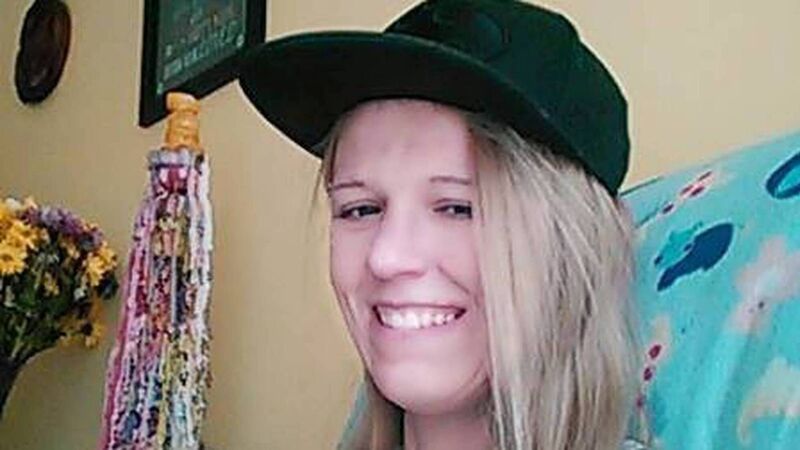Mick Clifford: Mother failed by system that lets law and mental health collide

Monika Nawrat died in the Mater Hospital on October 14, 2019, after attempting to take her life in Dóchas women’s prison nine days previously
Monika Nawrat was 33 when she died. She was a native Pole, the mother of two young children, and had been living in Ireland for over a decade.
Life was not easy for her as she suffered from mental health difficulties.
The response of this State to the fall-out from her mental health difficulties was to lock her up in prison.
Therein, she attempted to take her own life, as she said she would.
On October 4, 2019 — the day after she was admitted to prison for the first and only time in her life — she was found in her cell with a ligature around her neck. She was taken to hospital and died 10 days later.
She was, in that respect, the latest casualty in a system in this country that is informed by reckless disregard whenever the law collides with mental health.
Her solicitor, Dorothy Walsh, who had known Monica for a number of years and took care of her end-of-life treatment, found the whole episode deeply distressing.
“Monika was a young mother who adored her children and should not have been there (in prison) in the first place and she should not have been treated as she was,” Ms Walsh says.
Monika Nawrat’s mental health illness was no secret.
According to an investigation by the Inspector of Prisons, published this week, she had attempted to take her own life in June 2019.
A passerby saw her in the sea near Bettystown, Co Meath, where she lived, and came to her rescue. She was admitted to a psychiatric unit as a result. Two months later, she again attended a psychiatric unit as a day patient.
Around this time there was also what should have been a minor matter from Ms Nawrat’s recent past that was returning to haunt her. On September 27, 2018 she had been involved in a public order incident giving rise to charges.
A family resource centre co-ordinator, who has extensive experience, told the inspectors that the offences “were a symptom of Ms X’s mental illness requiring treatment and support and not criminal justice intervention”. (Ms Nawrat is not identified in the inspector’s report).
Crucially, this view was shared by others.
“Her family law solicitor, who also practices in criminal matters, concurred with this opinion as did An Garda Siochána members and staff at the Irish Prison Service.”
So there is broad agreement that this vulnerable woman was engaged in behaviour as a result of her illness yet the State continued to process her through the criminal justice system.
Ms Nawrat failed to respond to a summons and a bench warrant was issued. She was arrested on October 3, 2019 and taken to Trim District Court. The court granted bail on condition of the lodging of a €100 surety to ensure her reappearance five days later when the matter would be dealt with.
Monika was in possession of around €5. She didn’t have the money to get bail and was taken into custody in the cells in the courthouse.
“While in custody she pulled out some of her head hair and scratched herself with her nails,” the inspector’s investigation reports.
“An ambulance was called and Ms X was taken to the Regional Hospital Mullingar emergency department accompanied by members of An Garda Siochána.”
These guards later brought Monika to the Dóchas Centre. They reported that she had a letter from the hospital and medication and was quiet on the journey.
A GSOC public interest investigation into the conduct of the gardaí involved in this case concluded “that there had been no breach of garda discipline regulations” and that “the investigation is now closed”.
One of the gardaí claimed that in the prison’s screening area, Monika said she would kill herself. Two assistant chief officers with the prison service who were present say they never heard this.
A garda also claims that when they presented Monica and passed on details of self-harming, one of the officers replied: “Another one.” This is denied by the prison officer.
When being examined later that evening, Monika told the nurse that she had been self-harming since the age of 11 and had had occasional bouts of schizophrenia.
The assessment made on her condition was that she would be best served by placing her in a vulnerable shared cell in order to “to mitigate any potential risk”.
Later that evening an officer reported that the three women in the cell were engaged in conversation.
The following day she was examined by the prison doctor who told the inspectors that “even if it was reported that Ms X had stated she would harm herself when she arrived at the Dóchas Centre it would not have altered the healthcare decisions as threats like this (to self harm) are frequent in the women’s prison”.
Later in the day she called the Family Resource Centre in Bettystown, which had been helping her, to see if she could get the bail money. The call was cut off after six minutes, the allocated time.
That afternoon, she learned that her two cellmates from the night before were to be moved elsewhere because they were no longer considered vulnerable. That left her on her own.
“CCTV shows Ms X spent the remainder of the day mixing with others on the landing or in her cell,” the report states.
“She had lunch and her evening meal. At 18:44hrs she can be seen collecting a mop and bucket from a storage room and returning to her detention room. Two minutes later she returns the items to the storage room and goes back to her detention room.
“The healthcare/committal unit detention rooms were locked at 19:16hrs, and Ms X was now alone in her prison detention room.”
Later, a nurse visited with Monika’s medicine. She was checked on in regular intervals as recorded by CCTV. At 11.31pm, as part of a routine check, she was seen to be suspended by a ligature from a disused TV bracket on the wall.
Medical aid was immediately summoned and within 40 minutes she was transferred to the Mater Hospital.
The Inspector of Prisons report included a number of criticisms about Monika’s detention.
“The absence of a procedure to share information for Ms X to be in shared accommodation was detrimental to her safety. Record keeping and the exchange of any risk factor should be addressed by the Irish Prison Service as part of its plans to deliver the National Suicide Prevention Strategy,” the report states.
“The OIP (Office of Inspector of Prisons) has criticised Irish Prison Service record keeping on several occasions. Accurate record keeping is an important element for prevention of self-harm… significant improvements in record keeping should be a priority for the IPS.”
There were also issues around the extended time it took for the inspector’s office to receive full documentation from the prison. These type of issues have arisen repeatedly in investigations in the aftermath of deaths in prison.
Monika Nawrat was gravely ill in the intensive care unit while in the Mater. She was visited by the father of her children, but for unspecified reasons he was not named next of kin.
Two prison officers were placed outside the door of her room. Six days after her admission, October 10, the solicitor Dorothy Walsh — who had been dealing with Monika for years on family law matters — applied to Trim District Court for the public order offences to be struck out. This was granted.
At that point, the prison officers withdrew from guarding her at the hospital.
There is no suggestion that the judge in the court in Trim did anything but follow the law and process as it is set out.
But the upshot of that process is that the State imprisoned a damaged woman on remand for an offence directly attributable to her illness. The setting where she was detained was never designed to treat mentally ill patients but the same criticisms keep coming up about basic care of prisoners.
On October 14, at Monika’s bedside in hospital, Dorothy Walsh arranged for prayers to be played in the dying woman’s native Polish language during her last moments. Monika was pronounced dead at 11.11am.
Ms Walsh says that she is very happy with the investigation by the Inspector of Prisons.
“They left no stone unturned, it’s a testament to the work they put in but the findings are heartbreaking. I was with her the whole way through, I was allocated as the person to deal with her end-of-life decisions.
“The key recommendation is that when there is a handover from the gardaí that the procedure will be properly documented. That’s in force in Northern Ireland, but it is simply not done here.”
Keith Adams of the Jesuit Centre for Faith and Justice, which closely monitors conditions in which prisoners are held, says this is a profoundly distressing and sad story.
“This tragic death should be a watershed moment for female imprisonment in Ireland and a catalyst for change,” he says.
“Women like this need mental health services, not imprisonment. This young woman was imprisoned because she could not afford to pay a small sum of money for bail. She ultimately ended up paying with her life.”





